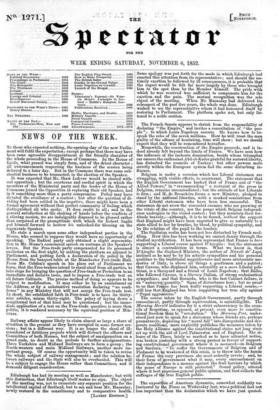The French Senate appears to shrink from the responsibility of
declaring "the Empire,' and invites a consultation of "the peo- ple " • to which Louis Napoleon assents. He knows how to be- speak the echo of the seven millions. How he will treat the men guilty of the offence of hesitating, time will show; but we should expect that they will be remembered hereafter.
Meanwhile, the construction of the Empire proceeds, and is in- deed already felt beyond the limits of France. We have seen how the influence of the inchoate domination, beside whose triumphal car careers the enthusiast Abd-el-Seder grateful for restored liberty, has disturbed the Councils of Turkey ; but other powers more strictly within the European system feel the same disturbing in- fluence.
Belgium is under a coercion which her Liberal statesmen are struggling, with visible efforts, to counteract. The statement that the English Government has backed that. of France and of "the Allied Powers," in " recommending " a restraint of the press in Belgium, remains nncontradieted ; but the attitude of her Liberals is firm ; and M. de Brouckere forms a new Ministry, pledged to stand by the national liberties, with a marked concurrence from other Libeial statesmen who have been less successful. The statesmen de not avow the concealed enemies who are gnawing at the vitals of the country, nor the pangs which Belgian independ- ence undergoes in the veiled contest ; but they maintain their for- titude bravely,—although, it is to be feared, without the support that England might have been expected to give so naturally to a state allied to her by treaties, by blood, by political sympathy, and by the relation of the pupil to the teacher. The Sardinian realm has been not less disturbed by French med- dling, How this has been working we cannot descry through the studied' mystification. It has been represented that France is here suppoking a Liberal course against D'Azeglio : but the statement is almost a contradiction in terms. What we know is, that D'Azeglio the displaced Minister, the author of NicooM de' Lapi, inclined as he may be by his artistic sympathies and his personal qualities to the traditional magnifieenees and more aristocratic me- mories of Italy, is above all things a gentleman and a patriot; that Cavour, who displaced him, ostensibly as a more Liberal poli- tician, is a Savoyard and a friend of Louis Napoleon ; that Balbo, who followed Cavour, is a literary Italian, of strong ecclesiastical sympathies; and that Bormida, who is the last Cabinet failure, is an "unknown: quantity." Signs of disturbance here ; but no proof to us that Mince has been really supporting a Liberal course,— still less that Xrigland has been supporting her true ally against " Papal aggrebSions." The coarse taken- by the. English Government, partly through concealment, partly through'equivocation, is unintelligible. The Morning Herald indicates for it a strict subserviency to the coun- cils of despotism, as opposed, at present, even more to constitu- tional freedom to ' revolution.". The Morning Poet, under- stood just now-to speak for a statesman whose friends are, perhaps prematurely, deploring his " moral fall" into disreputable and des- perate coalitions, more explicitly publishes the measures taken by the Holy. Alliance against the constitutional states not long since set up with the aid of Lora. Palmerston and of England. The si- lence of the Aiwa, lately so marked as to have attracted notice, was broken yesterday with a strong protest in favour of support- ing constitutional government where it is menaced—in Belgium and Sardinia. • " To suffer the Governments of Belgium and of Piedmont to be weakened at this crisis, iii to throw into the hands of France the very provinces she most ardently covets ; and, be their form of -government what it may, every encroachment on their independence is a menace against the frail barriers by which the peace of Europe is still protected." Sound policy, uttered where it best expresses general public opinion;and best collects the suffrages of the true English public.


























